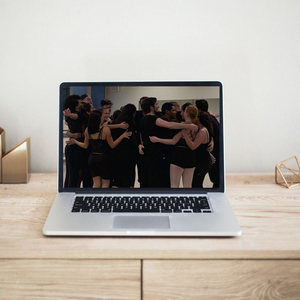Student Blog: Getting My FOMO in Musical Theatre
A year and a half of virtual learning will take a toll on any student, but an unexpected challenge arose having to suddenly study solo: I missed making mistakes
I spent my junior year of college working on my BFA in Musical Theatre from home. Only a few weeks in, I should have switched my major from a BFA in Musical Theatre to a FOMO in Musical Theatre (Fear of Missing Out). While I sat at home with my parents and my dog, I watched from 1,400 miles away as my friends danced together (socially distanced, wearing masks), enjoyed outdoor picnics together, and spent time in New York City together. They were living the socially distanced and sanitized college life that I couldn't.

ballet class in my parents
living room.
I moved home to central Texas in March of 2020, expecting to be back to my Westchester campus in the fall of that same year. However, situations change, especially in a global pandemic, and I decided it would be best for me and my family to stay home and complete two semesters virtually. I admit I enjoyed sleeping in my own bed and only needing to wake up and grab my laptop a few minutes before class started and still be on time, but the convenience didn't outweigh the frustration.
Seeing posts on social media of class dance combos, singing in the practice rooms, and more made me miss my friends and my school, but also helped me realized why I was feeling so frustrated: I felt stuck. Compared to my on-campus friends, I wasn't making any progress. My voice hadn't grown, I wasn't any more flexible, and my countless self-tapes seemed unpolished. My work felt stagnant as if nine months of performing arts classes hadn't gone by.
On the other hand, my friends and classmates were thriving on-campus. When I heard them sing in class via my little Zoom box, they sounded perfect every time. When I saw their social media posts of a song they had been writing, it was beautiful. Dance photos, singing videos, monologue reels, and more popped up on my social media feed, and it all seemed perfect.
I wanted to celebrate my friends, but all I could see was how much they had grown, and how much I...hadn't.
I was missing a key ingredient of the performing arts college experience: participating in the process. In a normal setting, pre-Covid, I spent almost every hour of the school day with my musical theatre peers. We walked from class to class together, had back-to-back lesson times, and overlapping coaching slots. Every member of our MT class was involved in each other's artist's growth process. I heard the cracks and squeaks through the studio doors during a lesson. I heard the complaints about having a challenging ballet class over dinner in the dining hall. I listened and provided feedback when friends needed to rehearse a monologue late in the evening. I saw, heard, and actively participated in their growth.
But now, 1,400 miles away, I wasn't. I only saw the most practiced and polished version of the performance on social media. I didn't see the three hours' worth of takes they worked on to get the perfect shot. I didn't hear the groans over vowel shapes and breath support. I just saw the finished product of others, while I couldn't escape the mistakes and learning that I was doing.
Being an active participant in your classmates' learning and growing experience is more important than I had ever thought. We learn from each other. We build off each other. Community is necessary for the arts. I'm planning to return to campus this fall, where I can finally shake off the perception of perfection that made itself at home in my mind. I can't wait to make mistakes in front of my classmates: crack on notes, fall out of turns, and forget lines. No one is ever alone in making mistakes; it's a natural part of learning and growing. Seeing others' growth through mistakes and challenges is one of the biggest encouragers a student could have.
Videos


